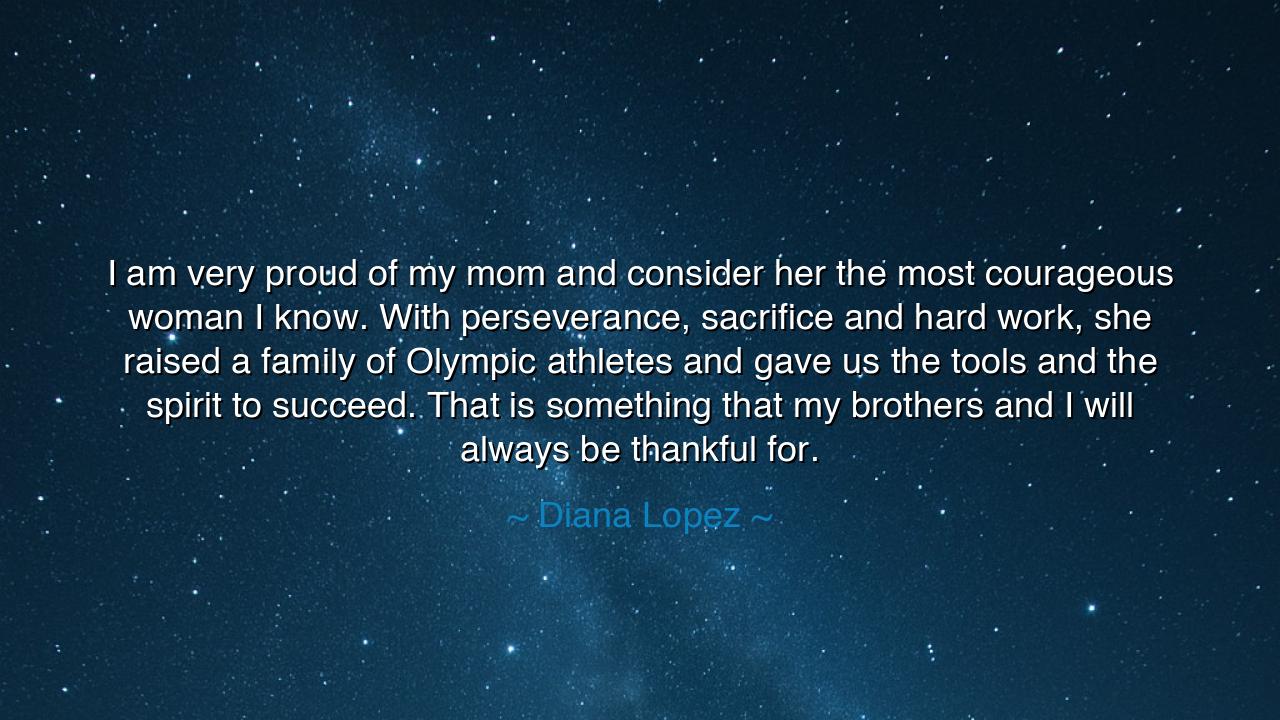
I am very proud of my mom and consider her the most courageous
I am very proud of my mom and consider her the most courageous woman I know. With perseverance, sacrifice and hard work, she raised a family of Olympic athletes and gave us the tools and the spirit to succeed. That is something that my brothers and I will always be thankful for.






When Diana Lopez declares, “I am very proud of my mom and consider her the most courageous woman I know. With perseverance, sacrifice and hard work, she raised a family of Olympic athletes and gave us the tools and the spirit to succeed. That is something that my brothers and I will always be thankful for,” she lifts her voice in a hymn of gratitude not for riches or glory, but for the quiet strength of a mother. In her words, we hear the eternal truth that the foundation of greatness is not always laid in stadiums or arenas, but in the unseen sacrifices of those who nurture and guide us.
The origin of this gratitude is found in the life of a woman whose courage was expressed not in public triumphs, but in daily acts of love, labor, and resilience. Lopez honors her mother as the architect of their family’s destiny, one who forged athletes not merely with training, but with perseverance, sacrifice, and hard work. To raise children who would stand as Olympic competitors is no small feat; but more than medals, she gave them the spirit—the inner fire—to face life’s battles with dignity. Thus, the children’s thankfulness is not only for what they achieved, but for the woman who gave them the strength to achieve it.
History abounds with parallels. Consider Cornelia, mother of the Gracchi brothers in ancient Rome. When others displayed their wealth in jewels and treasures, Cornelia pointed to her sons and declared, “These are my jewels.” Her sacrifices and teachings gave Rome leaders whose names echoed through history. Like Diana Lopez’s mother, Cornelia’s greatness was not adorned with gold or crowns, but measured in the legacy of her children. Such women remind us that courage is not only in the battlefield or the arena, but also in the home, in the patient shaping of lives.
Lopez’s words also remind us of the hidden cost of success. The world may see Olympic champions standing tall beneath their nation’s flag, but behind that image are years of unseen labor—the mother waking early, sacrificing comforts, bearing burdens so her children could pursue their dreams. This truth calls us to honor not only those who compete, but also those whose sacrifices make competition possible. Thankfulness here becomes a sacred duty: to remember those who worked in silence so that others might shine.
There is also profound humility in her tribute. Diana Lopez, herself a decorated athlete, does not boast of her victories, but bows her head in honor of her mother. In this humility lies wisdom: that success is never ours alone, but the fruit of many sacrifices woven together. To acknowledge this truth is to resist arrogance and to embrace gratitude. The spirit of thankfulness binds us to our roots and keeps our hearts grounded, no matter how high we rise.
The lesson for us is powerful: behind every triumph there are hidden heroes—parents, mentors, teachers, friends—whose labor sustains the visible glory. To forget them is to dishonor the very foundation of our lives. Like Diana Lopez, we must learn to speak gratitude not only in silence but aloud, lifting up those who gave us the spirit to endure. Their sacrifices must be cherished, remembered, and repaid in lives of integrity and courage.
Practical wisdom follows. Reflect upon those who sacrificed for your sake: a parent, a guardian, a teacher, a friend. Speak your gratitude to them while you can. Live in such a way that their sacrifices are not wasted, and when your own time comes to guide others, embrace perseverance, sacrifice, and hard work with the same spirit. In this way, gratitude becomes not just words, but a living legacy.
Thus, in the words of Diana Lopez, we hear an ancient and eternal truth: that the truest champions are not only those who stand on podiums, but those who quietly shape lives with love and sacrifice. To be thankful for them is to recognize the sacred chain of human effort that binds generations together. Let us, then, walk in gratitude, honoring those who came before us, and striving to become such pillars for those who will come after.






AAdministratorAdministrator
Welcome, honored guests. Please leave a comment, we will respond soon